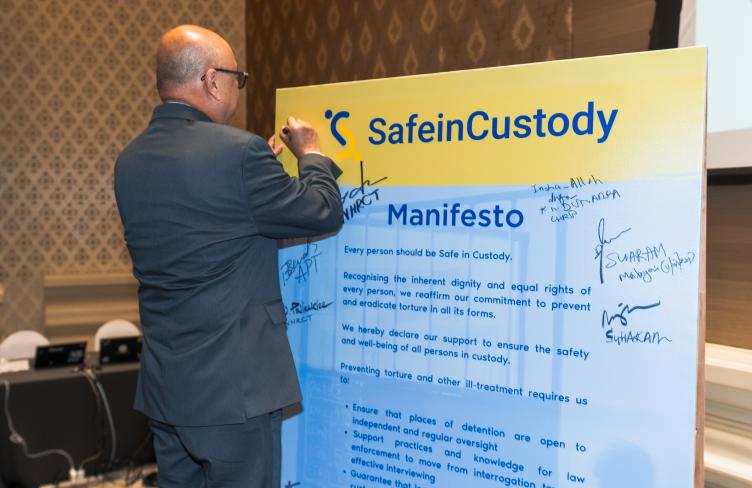
As populations globally are ageing the need for quality aged residential and community care is increasing. Finding oneself in need of such care and support is a reality of the modern world for many. Often those who end up in these situations are vulnerable and it is up to governments to ensure that their rights are protected and that they are treated with dignity.
A test of a people is how it behaves toward the old. It is easy to love children. Even tyrants and dictators make a point of being fond of children. But the affection and care for the old, the incurable, the helpless are the true gold mines of a culture.
Abraham J Heschel
The risk of abuse and ill-treatment in closed environments – in institutions or facilities where people are not free to leave of their own will – is well established.
Beyond traditional detention settings, such as prisons or closed psychiatric institutions, there are many people being deprived of their liberty, by virtue of the type of care or treatment that they are receiving, or the level of restrictive practices they are subjected to. Aged care facilities can be considered closed environments: environments where individuals are dependent on others for the basic necessities of life – food, water and sanitation for example – and where their freedom of choice and of movement can be limited or taken away. Although providers - whether public or private - might not intend to deprive residents of their liberty, due to the residents’ high care needs such deprivation can all too often be the case.
The Optional Protocol to the Convention against Torture and Other Cruel, Inhuman or Degrading Treatment or Punishment (OPCAT) is an international human rights treaty designed to help States meet their obligations in preventing torture and ill-treatment in places where people are deprived of their liberty.
Unlike other human rights treaty processes that deal with violations of rights after the fact, OPCAT is primarily concerned with preventing violations. It is based on the premise that regular visits to places of detention are an effective means of preventing torture and ill-treatment and improving conditions of detention. This preventive approach aims to ensure that sufficient safeguards are in place and that any problems or risks are identified and addressed.
States who have ratified the OPCAT routinely apply its monitoring framework to traditional places of detention such as prisons and police cells. However, the same monitoring is often absent from less traditional places of detention.
Residents in aged care facilities are also in a situation where their liberty often is restricted. So why then are they not afforded the same protections as prisoners? Why are these facilities not systematically subject to the same minimum standards? And who is watching to make sure that residents are not subject to abuse and ill-treatment?
If residents received as much care as prisoners, they would receive daily showers, warm dry rooms, television, free medical and dental care, computers, good food and high staff ratio and all that would be required in addition would be the opportunity to be free to go outside the facility at will. This should not be too much to ask for those who have helped to develop this country and have also fought overseas for our freedom. It would appear that prisoners are more highly thought of than the older citizens.
Grey Power New Zealand
Although they may be subject to various types of general monitoring under the auspices of different government agencies, aged care facilities often lack the rigorous oversight from an OPCAT specific perspective and this remains concerning. Current monitoring and audits of aged care facilities are often not completely independent, can lack transparency and there is a risk they can be considered a pro forma activity for accreditation and other contractual requirements rather than a way of ensuring standards of care are maintained and improved, and that abuse and ill treatment is identified and mitigated over time. OPCAT monitoring can and should complement and enhance these existing systems of oversight and audit.
The OPCAT requires that the deprivation of liberty is based on a public order, or with the State’s acquiescence or consent. For traditional places of detention this poses little issue. However, for non traditional places of detention where people may be held on a voluntary basis, or with their family’s consent, without any official or public intervention, it is more problematic.
The UN Subcommittee on Prevention of Torture (SPT) has grappled with this issue and has stated in relation to Article 4 of the OPCAT:
"Article 4 contains two sub paragraphs which need to read consistently together and which places within the scope of the OPCAT any public or private custodial setting under the jurisdiction and control of the State party, where persons may be deprived of their liberty and are not permitted to leave, either by an order given by any judicial, administrative or other authority or at its instigation or with its consent or acquiescence.
It is inevitable that there will be a degree of opaqueness about the precise parameters of the definition when translated into operational practice. However, the preventive approach which underpins the OPCAT means that as expansive an interpretation as possible should be taken in order to maximise the preventive impact of the work of the NPM.
The SPT therefore takes the view that any place in which a person is deprived of liberty (in the sense of not being free to leave), or where it considers that a person might be being deprived of their liberty, should fall within the scope of its visiting mandate – and, in consequence, under the visiting mandate of an NPM – if it relates to a situation in which the State either exercises, or might be expected to exercise a regulatory function."
Drawing on the SPT’s conclusion any place where people may not be free to leave that is subject to the regulation or oversight of the State would fall within the scope of Article 4. This would include facilities and residences which are contracted to the State and/or subject to national standards, rules or guidelines administered by the State.
In many countries aged care is provided by private providers, through contractual arrangements with government. Legislation governs the standards of care and facilities are subject to audit requirements. As such government has some regulatory control over the provision of care in these situations. In addition although some residents will be privately paying for their care, many will be receiving some form of government subsidy. Aged care facilities can and should therefore form part of OPCAT monitoring frameworks.
We are all getting older. As I grow older I want to be confident that I will be safe and that I will be able to live with dignity. More needs to be done to prevent abuse and ill-treatment and to constructively work with facilities to improve conditions and care. It is time for States to consider the role of the OPCAT in relation to aged care facilities and other less traditional places of detention.
He aha te mea nui o te ao
He tangata, he tangata, he tangata
What is the most important thing in the world?
It is the people, it is the people, it is the people
Michael J V White, New Zealand Human Rights Commission, is a participant in the APF/APT Torture Prevention Ambassadors project.
Earlier TPA blog posts:
- Human rights training for Mongolian police and lawyers, by Oyunchimeg Purev
- Monitoring visits revealed successive transfers of detainees in Mongolia, by Agar-Erdene Gankhuyag
- The paradox of temporary lock-up cells in the Philippines, by Jacqueline de Guia
- Good internal data systems - important tools for prevention of torture, by Sidonio Soares
Photo: Lori Waselchuk


